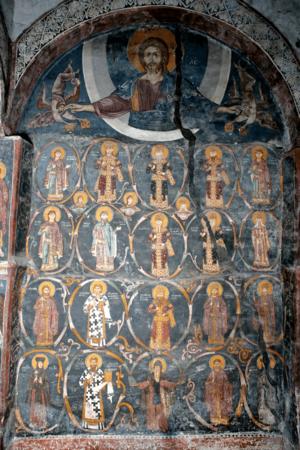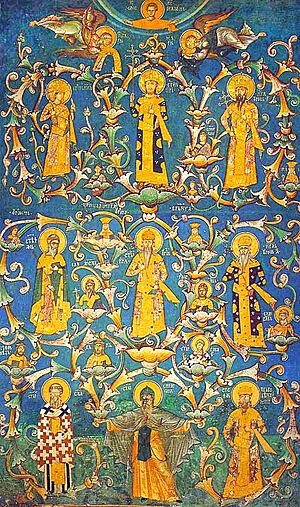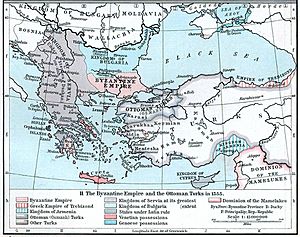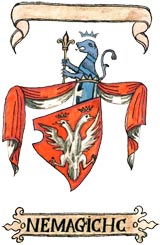Nemanjić dynasty facts for kids
| Nemanjić |
|||
|---|---|---|---|
Quick facts for kids 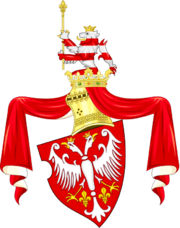 |
|||
| Country: | Serbia:
|
||
| Parent House: | Vukanović dynasty | ||
| Titles: | *Grand Prince (Veliki Župan / Велики Жупан)
|
||
| Founder: | Stefan Nemanja | ||
| Final Ruler: | Stefan Uroš V of Serbia | ||
| Founding Year: | 1166 | ||
| Dissolution: | 1371 (see fall of the Serbian Empire) | ||
| Cadet Branches: | *Dejanović noble family (maternally)
|
||
The House of Nemanjić (Serbian Cyrillic: Немањић, plural: Немањићи; Serbian Latin: Nemanjić, plural: Nemanjići) was the most important ruling family in Serbia in the Middle Ages. This powerful family gave Serbia twelve rulers, who led the country from 1166 to 1371.
The Nemanjić family started with Stefan Nemanja. He was part of a smaller branch of the Vukanović dynasty. After Nemanja, all the rulers used "Stefan" as part of their name. This was a tradition to show their royal status.
At first, the Nemanjić rulers were called Grand Princes. In 1217, Stefan Nemanjić became King, making Serbia a Kingdom. The Serbian Orthodox Church was also created in 1219. Later, in 1346, Stefan Dušan was crowned Emperor of the Serbs and Greeks. The Serbian Church also became a Patriarchate at this time.
The Nemanjić family's rule in Serbia ended in 1371. This happened when Stefan Uroš V died without children. His death led to the fall of the Serbian Empire. After this, local lords took control of their own areas. Some later members of the Nemanjić family lived in other regions, but their direct rule in Serbia was over.
Contents
How the Nemanjić Dynasty Began
In the 8th century, the Vlastimirović Dynasty created the first Serbian state. This state fell apart around 940-960. The Byzantine Empire then took control for about 100 years.
In 1040, the Serbs, led by the Vojislavljević Dynasty, rebelled in a region called Duklja. Later, in the 1090s, the Vukanović Dynasty formed the Serbian Grand Principality. By the mid-12th century, Stari Ras became an important Serbian center. In 1166, Stefan Nemanja took the throne. This moment marked the start of the Nemanjić rule in Serbia.
Serbia's Golden Age Under the Nemanjić Family
Serbia became very powerful during the Nemanjić dynasty's rule. In 1217, the Serbian Kingdom was officially announced. This led to the creation of the Serbian Orthodox Church in 1219. In the same year, Saint Sava wrote Serbia's first constitution, called St. Sava's Nomocanon.
Tsar Stefan Dušan declared the Serbian Empire in 1346. During his time, Serbia grew a lot in size and power. It became the strongest state in the Balkans. Dušan also created a detailed set of laws called Dušan's Code. He opened new trade routes and made the country's economy stronger. The Nemanjić dynasty and the Serbian Orthodox Church greatly shaped Serbia's identity.
Stefan Dušan tried to organize a large Christian army to fight against the growing Ottoman Turks. However, he died suddenly in December 1355. His son, Uroš, became the next ruler. He was called the Weak. This name also described the state of the empire, which slowly began to break into smaller parts. This was a time when the Ottoman Turks became a major threat, spreading from Asia into Europe.
Important Nemanjić Rulers
The Nemanjić dynasty ruled the Serb lands from about 1166 to 1371.
| Picture | Ruler's Name | Years Ruled | Key Facts | ||||
|---|---|---|---|---|---|---|---|
 |
Grand Prince Stefan Nemanja |
1166–1196 | He founded the Nemanjić dynasty. He brought many neighboring lands under Serbian control. In his later years, he became a monk and is known as Saint Symeon. | ||||
 |
Grand Prince Vukan |
1202–1204 | Eldest son of Stefan Nemanja. He ruled some areas as Grand Prince. He briefly took the throne from his brother Stefan with help from Hungary. | ||||
 |
King ↑Grand Prince Stefan the First-Crowned |
1196–1202 1204–1228 |
Second son of Stefan Nemanja. He became Grand Prince in 1196. He was crowned King in 1217. His brother Sava helped Serbia gain full church independence in 1219. | ||||
 |
King Stefan Radoslav |
1228–1233 | Son of Stefan the First-crowned. His uncle Sava crowned him King. He lost the support of his people and fled in 1233. | ||||
 |
King Stefan Vladislav |
1233–1243 | Son of Stefan the First-crowned. He ruled for 10 years before his younger brother Uroš took the throne. | ||||
 |
King Stefan Uroš I |
1243–1276 | Son of Stefan the First-crowned. He improved trade with cities like Dubrovnik. He was overthrown by his son Stefan Dragutin in 1276. | ||||
 |
King Stefan Dragutin |
1276–1282 1282–1316 |
Son of Stefan Uroš I. He became King with help from Hungary. He later gave the main rule to his younger brother Milutin due to an injury. He continued to rule a northern part of the kingdom. | ||||
 |
King Stefan Milutin |
1282–1321 | Son of Stefan Uroš I. He expanded Serbia's territory, conquering parts of Macedonia and Albania. He also helped the Byzantines fight the Ottoman Turks.
|
||||
 |
King Stefan Konstantin |
1321–1322 | Younger son of Stefan Milutin. He was defeated by his older brother, Stefan Dečanski. | ||||
 |
King Stefan Dečanski of Dečani |
1322–1331 | Older brother of Stefan Konstantin. | ||||
 |
Emperor ↑King Stefan Dušan the Mighty |
1331–1355 | Son of Stefan Dečanski. He was a very skilled military leader. He greatly expanded the Serbian realm, doubling its size. He was crowned Emperor in 1346 and created Dušan's Code. | ||||
 |
Emperor Stefan Uroš V the Weak |
1355–1371 | Son of Stefan Dušan. He became Emperor after his father's death. He was called the Weak because the empire began to break apart during his rule. |
Monasteries and Churches Built by the Nemanjić Family
The Nemanjić family played a huge role in spreading Eastern Orthodoxy in the Balkans. They were famous for building many Orthodox monasteries and churches. Their strong faith was a main reason they were such an important family in Serbia. Thanks to them, Serbia has many amazing historical buildings and churches.
Some of the well-known monasteries they built include:
- Žiča Monastery
- Studenica Monastery
- Gračanica Monastery
- Mileševa Monastery
- Hilandar
- Sopoćani
- Visoki Dečani
- Monastery of the Holy Archangels
- Our Lady of Ljeviš
Other Important Nemanjić Family Members
- Đorđe Nemanjić (1208–1243), a King (in name) of Zeta.
- Stefan Vladislav II, King of Syrmia, (ruled 1321–1325).
Family Tree
See also
- List of Serbian monarchs
- Vojislavljević dynasty
- Branković dynasty
- Lazarević dynasty
 | Claudette Colvin |
 | Myrlie Evers-Williams |
 | Alberta Odell Jones |


